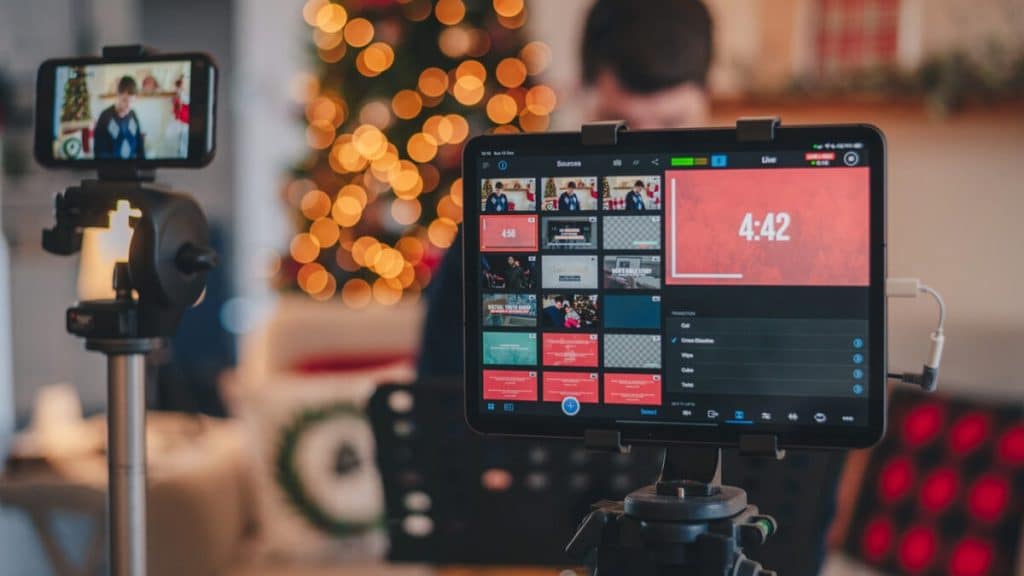Want to make money with music but tired of watching those streaming pennies add up too slowly? You’re not alone. Most musicians need more than just streaming to make a real living from their music. Let’s explore some proven ways to earn money with your music skills.
Introduction
Streaming pays artists between $0.003 and $0.005 per play. This means you’d need about 200,000 streams just to make $1,000. Smart musicians know the real money often comes from multiple income sources.
Take beat selling, for example. Successful producers like Luke Mounthill have built thriving businesses by creating and selling beats online, combining upfront sales with long-term royalty opportunities. Their success shows how diversifying your income streams can transform music from a passion into a profitable career.
A recent study of working musicians shows that the most successful ones use 3-4 different ways to make money from their music. Here’s what typically works best:
- Live shows and performances
- Getting music in movies and games
- Teaching other musicians
- Selling physical albums
Think of these income streams like backup plans. When one source slows down, the others keep money flowing in.
How Can Musicians Make Money Beyond Music Streaming?
Before jumping into specific methods, take a quick look at what you already have. Do you own recording equipment? How much time can you spend on music each week? These answers will help you pick the best money-making options.
The methods in this guide work for all kinds of musicians. Whether you’re just starting or have been making music for years, you’ll find practical ways to earn money from your skills.
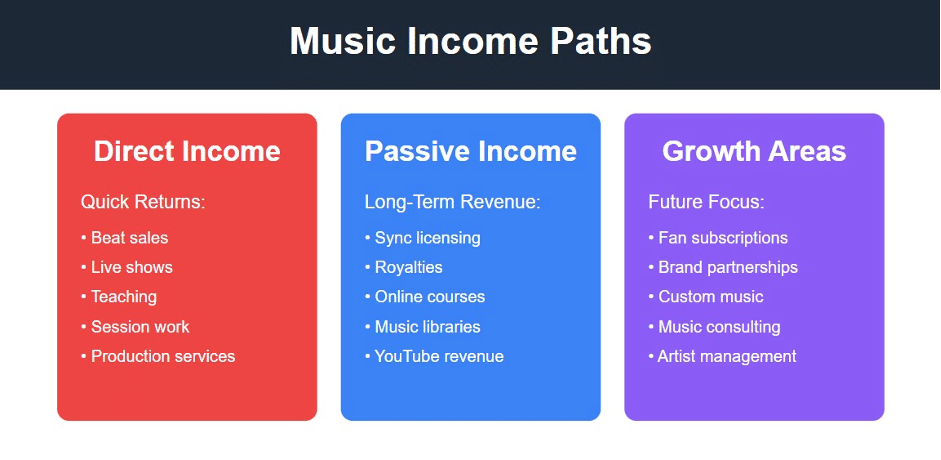
Ready to start earning? Let’s look at 15 tested ways to make money with your music beyond just streaming platforms like Spotify and Apple Music.
1. Sell Your Beats Online
Want to make money while you sleep? Selling beats online lets you earn passive income from your music production skills. Many producers make $500-$2,000+ monthly selling beats to artists worldwide.
Creating and Selling Beats Successfully
The key to selling beats is making music that artists want to buy. Start with popular genres like hip-hop, R&B, or pop. Keep your beats simple enough for artists to add their vocals.
What you need to start:
- Basic studio equipment ($300-$500)
- Digital Audio Workstation (DAW) software
- Good quality sample packs
- Strong mixing skills
Your home studio doesn’t need to be fancy. Focus on making clean, professional-sounding beats with good drum patterns and catchy melodies.
Best Platforms and Pricing
Start selling your beats on these trusted platforms:
BeatStars – One of the most popular platforms for selling beats, offering a built-in marketplace, promo tools, and collaboration features.
Airbit – A producer-friendly platform, with instant delivery, and no commission on sales for paid users.
TrakTrain – A curated marketplace known for its sleek design and strong focus on independent producers.
Price your beats based on license type:
- Basic MP3/WAV lease: $30-$50
- Trackout stems: $80-$150
- Exclusive rights: $200-$1,000
Pro Tip: Offer package deals (Buy 2 Get 1 Free) for artists who want to buy multiple beats. This encourages bigger sales and repeat customers.
2. Sync Licensing: Get Your Music in Films and Games
Ever heard a song you love in a TV show? That’s sync licensing at work. Music producers earn money by getting their songs into movies, TV shows, video games, and ads. Some sync deals pay between $500-$5,000 per placement, depending on where your music gets used.
Understanding Sync Licensing Process
Getting started with sync licensing isn’t as hard as you might think. First, make sure your music is 100% original – no samples from other songs. Then create different versions of each track:
- Full song (2-3 minutes)
- Short version (30-60 seconds)
- Version without vocals
- Loops (15-30 seconds)
Music libraries look for songs with clear emotions or moods. Think about what feeling your music creates – is it happy, sad, exciting? This helps libraries match your music with the right projects.
Landing Your First Sync Deal
These music libraries accept new artists:
- Epidemic Sound
- Musicbed
- Artlist
- Premium Beat
Pro Tip: Make instrumental versions of all your songs. TV shows and ads often prefer music without lyrics so they don’t compete with voice-overs.
3. Live Performances and Tours
Nothing beats the money you can make from playing live shows. Local bands often earn $200-$500 per night, while bigger acts can make thousands. Plus, you build a real connection with your music fans.
Types of Performance Opportunities
Start small and build up your live show experience:
- Open mic nights (practice your skills)
- Local bars and cafes ($100-$300)
- Wedding gigs ($500-$2,000)
- Music festivals (varies widely)
- Private events ($300-$1,000)
Many venues book bands months in advance. Start reaching out early and keep a calendar of upcoming shows. Always get your agreements in writing, even for small gigs.
Maximizing Live Show Income
Smart musicians make money from more than just the performance fee. Set up a merch table at every show. Fans love buying t-shirts, CDs, or vinyl right after seeing you play live.
Quick tips for better pay:
- Build an email list at every show
- Sell merchandise during breaks
- Partner with other local bands
- Record live performances for content
4. Create and Sell Music Production Services 🎧
Start making money with your music production skills by helping other artists sound better. Many home studio owners earn $50-$200 per hour offering recording and mixing services.
Recording and Mixing Services
You don’t need an expensive studio to start. Here’s what clients often look for:
- Vocal recording ($50-100/hour)
- Beat mixing ($100-300/track)
- Full song production ($300-1,000/song)
- Audio editing ($30-50/hour)
The secret to getting clients? Make some example tracks showing what you can do. Record a few local artists for free to build your portfolio and get testimonials.
Working with Other Musicians
Make working with clients easier by setting clear rules:
- Write down your rates
- Get payment upfront
- Set revision limits
- Share progress updates
Pro Tip: Create service packages. Instead of charging by the hour, offer complete packages like “Song Production Package: Recording + Mixing + Mastering = $500.”
5. Write Songs for Other Musicians
Many successful musicians make their real money writing songs for other artists. A single song placed with a popular artist can earn thousands in royalties.
Building Your Songwriting Career
Start by choosing one genre to focus on. Study the top songs in that style and learn what makes them work. Write at least one new song every week to build your skills.
Quick tips for better songs:
- Keep melodies simple and catchy
- Write clear, memorable hooks
- Use current slang and phrases
- Make lyrics relatable
Your first few songs might not be hits – that’s normal. Keep writing and your skills will improve fast.
Understanding Music Royalties
When you write songs, you can earn money in several ways:
| Royalty Type | What It Pays For |
| Performance | Radio, TV, live shows |
| Mechanical | Streaming, downloads |
| Sync | Movies, ads, games |
| Sheet music sales |
Join a Performance Rights Organization (PRO) like ASCAP or BMI to collect your royalties. They’ll make sure you get paid when your songs are used.
6. Teach Music and Share Your Knowledge 🎹
Turn your music skills into teaching income. Music teachers earn $30-60 per hour, and some make even more with online courses. Best part? You can teach from home or anywhere with internet.
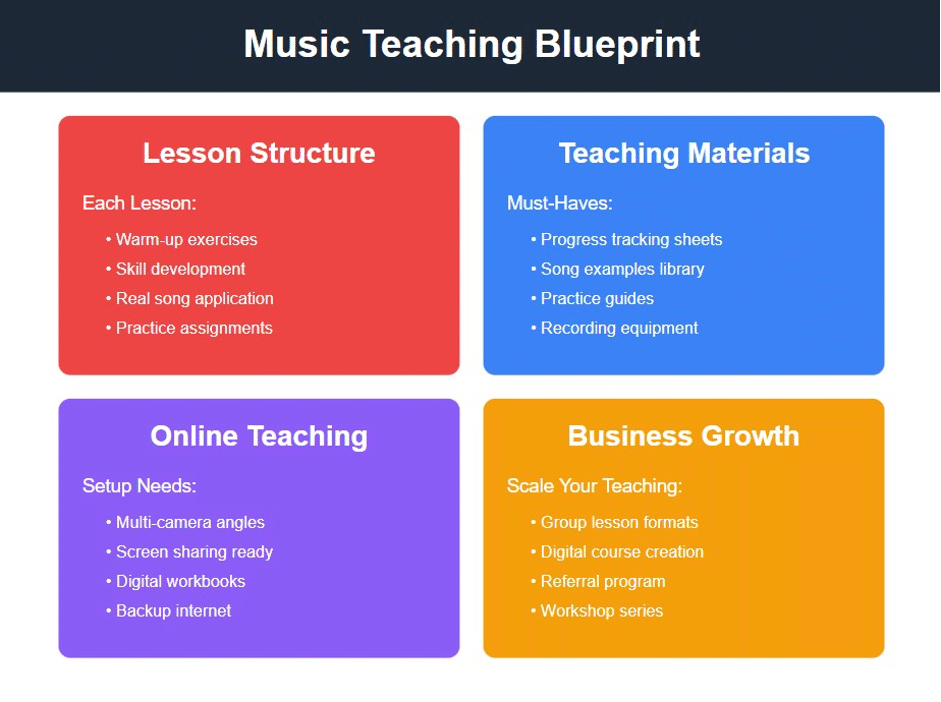
Online vs In-Person Teaching
Choose your teaching style based on your schedule:
In-Person Lessons:
- Higher hourly rates ($40-80)
- Better for hands-on instruction
- Build local reputation
- No tech hassles
Online Lessons:
- Teach students worldwide
- Save travel time
- Lower overhead costs
- Flexible scheduling
Start with one student and add more as you get comfortable. Many teachers mix online and in-person lessons for the best income.
Creating Music Courses
Ready to teach more students at once? Create an online course. Focus on teaching one specific skill like:
- Music theory basics ($97-197 per course)
- Beat-making fundamentals
- Vocal techniques
- Guitar for beginners
Record your best lessons and sell them as a course. This turns your teaching into passive income – make money while you sleep!
7. Build a Profitable YouTube Channel 🎥
YouTube offers multiple ways to make money with music. Successful music channels earn through ads, sponsorships, and product sales.
Music Content Strategy
Create videos your audience actually wants to watch:
- Song tutorials and covers
- Music production tips
- Gear reviews
- Behind-the-scenes content
Post new videos every week. Quality matters more than fancy equipment – start with your phone camera and focus on helpful content.
Monetization Methods
Don’t rely just on YouTube ads. Smart creators use multiple income streams:
| Income Source | Requirements | Potential Monthly Earnings |
| Ad Revenue | 1,000 subs, 4,000 watch hours | $100-500 |
| Channel Memberships | 1,000+ subscribers | $200-1,000 |
| Super Chat | 1,000+ subscribers | Varies |
| Merchandise Shelf | 10,000+ subscribers | $300-2,000 |
Build your subscriber base by answering common music questions in your videos. Use clear titles that match what people search for on YouTube.
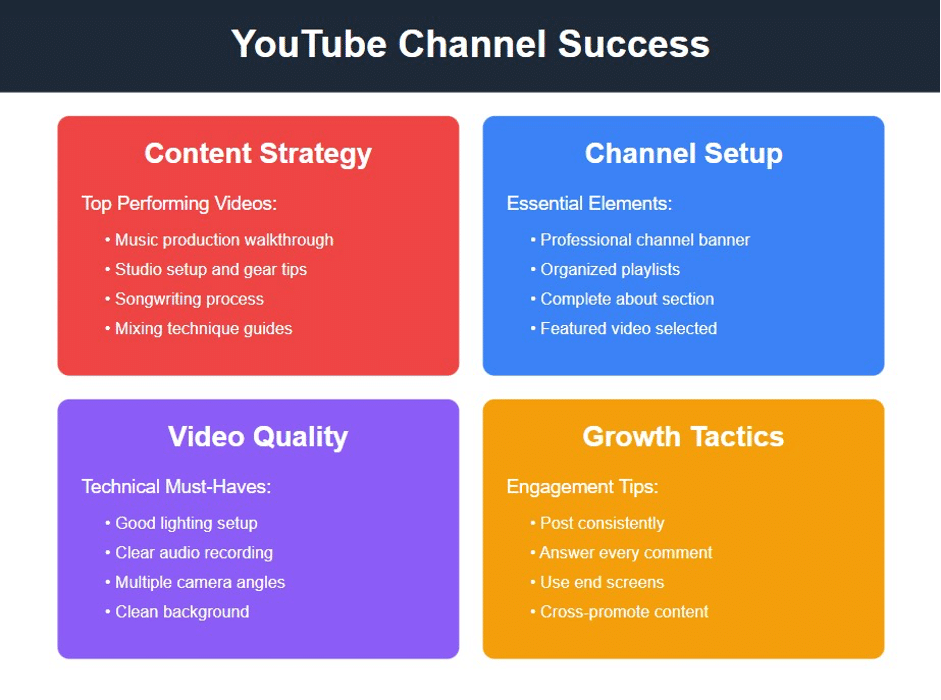
8. Design and Sell Artist Merch 👕
Turn your fans into walking billboards! Smart musicians make extra money selling merch. Your music fans want to support you – give them something cool to buy.
Popular Merch Options
Start with these proven sellers:
Basic merch lineup:
- T-shirts ($20-30)
- Hoodies ($40-60)
- Stickers ($3-5)
- Phone cases ($15-25)
Most successful artists start small with just t-shirts and stickers. Add more products as you see what sells best.
Setting Up Your Store
You don’t need to buy inventory upfront. Print-on-demand services handle everything:
| Platform | Setup Cost | Profit Margin |
| Printful | Free | 30-40% |
| Teespring | Free | 25-35% |
| Shopify | $29/month | 40-50% |
Test designs with your social media followers before printing. Let them vote on their favorites to ensure good sales.
9. Offer Session Musician Services
Got solid playing skills? Studios and bands always need good musicians. Session work pays $50-300 per song, depending on your skill and the project.
Studio and Live Work
Popular session services:
- Recording guitar parts
- Adding bass lines
- Playing drums
- Background vocals
- Piano/keyboard tracks
Make a demo showing your best playing. Include different styles to show your range. Keep it short – 2-3 minutes max.
Finding Session Work
Build your network to get steady work:
- Join local music groups
- Connect with studios
- Follow producers online
- Use musician hiring sites
Quick tips for success:
- Always show up prepared
- Learn parts quickly
- Bring backup equipment
- Stay professional
Create a simple one-page website showing your skills, gear list, and sample recordings. Makes you look more professional to potential clients.
10. Launch Music Crowdfunding Campaigns
Crowdfunding helps you raise money for your music projects. Whether you need cash for studio time or a new album, your fans can help make it happen.
Creating Successful Campaigns
The secret to crowdfunding is telling a story that connects with people. Share your journey and explain exactly how you’ll use the money. Be real – people support artists they trust.
Most successful campaigns offer these reward tiers:
- $10-25: Digital album download
- $50: Signed physical album
- $100: Private virtual concert
- $250: Producer credit on album
Your campaign page should include a good video explaining your project. Keep it under 3 minutes and show your personality. Fans want to feel like they’re part of your journey.
Reward Strategies
Creating smart rewards can make or break your campaign. Think about what you can offer that costs you time rather than money.
Popular platforms for music crowdfunding:
| Platform | Fee | Best For |
| Kickstarter | 5% | Album funding |
| Indiegogo | 5% | Tour support |
| GoFundMe | 2.9% | Emergency gear |
After launching your campaign, post regular updates. Let supporters see how their money helps create something amazing.
11. Physical Music Sales 💿
Don’t believe anyone who says CDs and vinyl are dead. Physical music sales still make good money, especially at live shows.
CDs and Vinyl Strategy
Package your music in ways that excite fans. Special editions and limited runs create urgency and justify higher prices.
Start with this basic pricing guide:
- Standard CDs: $10-15
- Deluxe CDs: $20-25
- Basic vinyl: $25-30
- Colored vinyl: $35-40
Remember that vinyl costs more to produce, but fans often pay premium prices for it. Start with a small test run of 100 records before making a bigger investment.
Direct-to-Fan Sales
Building a direct relationship with fans means keeping more money from each sale. Create a simple online store where fans can buy your music.
Best practices for selling physical music:
- Take pre-orders to gauge demand
- Sign every first-run copy
- Include bonus content
- Offer bundle deals
Your packaging matters almost as much as the music. Use quality materials that make fans feel they got their money’s worth. Include a personal thank you note in each package – small touches make big impressions.
12. Create Custom Music for Clients 🎵
Making custom music for businesses and clients can be a steady income source. From YouTube intros to podcast themes, there’s high demand for custom tracks.
Commercial Music Opportunities
Businesses often need custom music for:
- Advertising jingles
- App notification sounds
- Background music
- Company event themes
Creating custom music requires different skills than making your own songs. You’ll need to follow client briefs closely and hit specific emotional notes they want.
Most clients start with a clear idea of their budget. Having set packages ready makes pricing easier:
| Package Type | What’s Included | Price Range |
| Basic | 30-second track | $200-400 |
| Standard | 60-second track + revisions | $400-800 |
| Premium | Full song + unlimited revisions | $800-2000 |
Setting Your Rates
Your pricing should reflect your experience and the project complexity. Don’t forget to factor in:
Time spent on client meetings and revisions. Even a simple 30-second jingle might take several hours of back-and-forth communication.
Equipment and software costs need to be covered by your rates. Keep track of these expenses to price your services right.
13. Apply for Music Grants and Funding 💸
Free money for your music? Yes, please! Grants can fund your next album, tour, or music video. Many musicians overlook this opportunity.
Finding and Securing Music Grants
Start your grant search with these organizations:
- Local arts councils
- State music offices
- Private foundations
- Radio station funds
The best part about grants? Unlike loans, you don’t have to pay them back. But competition can be tough, so your application needs to stand out.
Application Tips
A strong grant application tells a compelling story. Focus on how your project will benefit others, not just yourself.
Key elements of winning applications:
- Clear project timeline
- Detailed budget
- Strong artist statement
- Past achievements
Remember to keep a calendar of grant deadlines. Many grants open at the same time each year. Missing a deadline means waiting another full year to apply.
Ask successful grant recipients to share their winning applications. Study how they presented their projects and use similar techniques in your own applications.
14. Launch a Fan Subscription Platform 🌟
Turn your biggest fans into monthly supporters! Platforms like Patreon let you earn steady income by sharing exclusive content with subscribers.
Building Your Platform
Start simple – offer just a few subscription tiers at first. Your early supporters will help you figure out what content works best.
Basic subscription structure:
- $5/month: Behind-the-scenes content
- $10/month: Unreleased demos
- $25/month: Monthly video calls
The key to keeping subscribers happy is posting regular content. Set a schedule you can actually stick to. It’s better to promise less and deliver more.
Creating Value for Subscribers
Think about exclusive content that’s easy for you to make:
- Studio session videos
- Early access to new songs
- Monthly live streams
- Personal video messages
Between posts, stay connected with your subscribers through updates and comments. Make them feel like part of your inner circle.
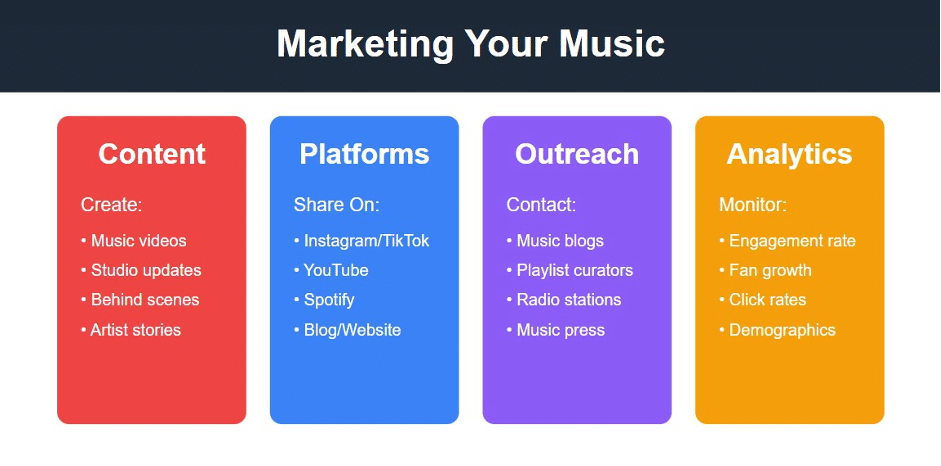
15. Music Business Services 💼
Help other musicians succeed and make money doing it! Your experience in music can help others avoid common mistakes.
Management and Consulting
New artists often need help with:
- Social media strategy
- Release planning
- Tour booking
- Brand development
Start by helping one or two artists for free. Use their success stories to attract paying clients.
Industry Opportunities
The music business needs people who understand both music and business. Popular services include:
| Service | Monthly Earnings | Skills Needed |
| Artist Management | $1000-3000 | Organization, networking |
| Tour Management | $2000-5000 | Logistics, problem-solving |
| Social Media | $500-1500 | Marketing, content creation |
Join music industry groups online. Answer questions and share advice to build your reputation as an expert.
Conclusion
Making money in music takes more than just great songs. Try combining 3-4 different methods from this guide to build steady income.
Start small:
- Pick one method that matches your skills
- Test it for 30 days
- Add another method once the first one works
- Keep what works, drop what doesn’t
Remember that every successful musician started exactly where you are. Take that first step today!
Need help deciding where to start? Look at your current skills and equipment. Choose a method that lets you start making money right away, then reinvest that money into trying other methods from this guide.
The music industry keeps changing, but one thing stays the same: There’s always money to be made if you’re willing to adapt and work smart. Now get out there and make it happen!
